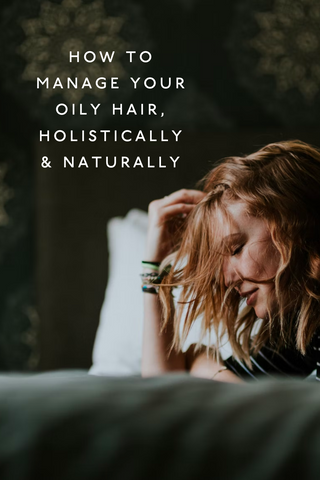Managing Oily Hair, Holistically
Did you know that washing too much or not enough could be the reason for your oily hair? This might not be the only reason, there are a lot of factors which contribute to a glossy, oily scalp.
The ingredients in your shampoo, conditioner and hair products may also be making their own contributions to your oily hair problem.
What we do understand is, managing oily hair can be very tricky, which is why we decided to share with you our learnings in managing (and hopefully balancing) the oil in your scalp and hair, both holistically and naturally.
Let’s begin with your hair wash routine.
Wash more frequently … or less frequently? That is the question.
Firstly, it is important to understand that your scalp naturally produces oil, called sebum. Produced by the sebaceous glands, the sebum helps protect your scalp and hair, protecting them from oxidative damage as well as the elements. This also supports your hair in feeling and looking hydrated.
Washing your hair too much, particularly with a soap based shampoo, can strip away these natural oils, as a result the scalp produces more oils to rebalance the sebum layer.
However, not washing enough can result in a similar imbalance. Leaving you with ultra-oily and greasy hair.
How much washing is enough?
The way to test your washing frequency is as follows:
Firstly, wash daily for a week. If your hair continues to appear oily after a daily wash, pull it back and try washing every second day, again for a week (or, ideally longer) and wait to see if the oil reduces.
Choosing the right shampoo and conditioner is important.
Look for chemical free, mild shampoos, with ingredients selected to lift the oil, rather than chemical laden shampoos that offer a deep soapy cleanse.
For the same reason as over-washing, if the strong, chemical laden shampoo strips your hair of it’s natural oils, it may result in an over production of oil as the sebaceous glands try to restore balance.
NueBar Oily Hair Shampoo is Naturopath formulated, free from toxic chemicals, it has been consciously blended with Calendula flowers, Neem oil and Kanuka to sooth the scalp. These ingredients offer anti-inflammatory and antibacterial properties to support the balance of oil levels in the hair.
Silicone is not your friend.
Choosing products that are Silicone Free is important when managing Oily hair. Look out for products detailing ingredients such as ‘dimethicone’, ‘cyclomethicone’ and/or ‘amodimethicone’, basically anything with ingredients ending in ‘*cone’
Silicones are added to many commercial shampoo and conditioners to add shine and to help smooth the hair. They also build up on the hair shaft, resulting in dirty, oily and lifeless looking hair. As they coat the hair, silicones also prevent moisture benefitting the hair shaft and scalp, especially during the all-important cleansing process.
How you wash is also important.
Whilst you may be washing with the best of intentions, it is possible to wash your hair incorrectly and end up with an oily scalp and damaged hair.
Washing gently is key.
Using your nails or aggressively scrubbing your scalp can overstimulate and irritate it, causing it to produce more oil. Rather, try washing gently using your fingertips to apply a small amount of shampoo into your roots and scalp.
When shampooing, it is important to focus on the top, rather than the ends. Skip the “repeat” cleanse, one shampoo per wash is more than enough.
Over conditioning is a thing.
When conditioning, work through the conditioner in the ends only. Look for lightweight conditioners, rather than rich conditioners. It is important not to skip the conditioning process, to ensure your hair remains moisturised and to help keep it balanced.
Unlike most conventional conditioners, NueBar Conditioner All Types doesn’t rely on silicones to coat the hair, creating an artificial shine. Instead, we add Highly nutritive Organic Coconut Oil and Vitamin B5 which are easily absorbable by the hair shaft. Lab studies have found that coconut oil also offers antifungal and antimicrobial properties, helpful for oily hair.
Rinse and rinse again.
Rinsing shampoo and conditioner thoroughly is extra important for those with oily hair. Spending extra time rinsing, ensuring there is no residual product left on your hair shaft and scalp can make a huge difference in how your hair looks and feels once it is dry.
Your hair isn’t the only thing that needs regular washing.
Wash your hairbrush, hats and pillowcases regularly. Oil builds up on surfaces which connect with your hair, distributing it back onto the hair shaft if not washed regularly.
Your hair will also have its up and down days.
Wearing your hair tightly pulled back every day can result in the oils spreading faster, it can also stimulate the scalp. Tie your hair loosely or wear it down as frequently as possible.
You are what you eat.
Diets high in oily and fried foods, sugar, dairy and salt can contribute your skin's oil production. Clean eating, including plenty of fresh vegetables, fruits and water as well as herbal teas will help balance the oil production in your skin. Replacing saturated fats with healthy oils, such as coconut oil, avocado oil and nut oils will also support a healthier lifestyle.
Exercise can offset this balance.
Sweat and chlorine can also upset the natural oil balance of your hair. Try to align your exercise days with your shampoo days. Remembering to let your hair dry loosely, rather than tightly tying it back after a wash.
Try not to stress about it.
Stress can often result in an increase in oil production throughout the entire body, resulting in oily scalp, face and back. Choosing something as simple as a daily walk to relax or mindful meditation practice can work wonders in supporting your overall wellbeing, as well as the health of your skin and scalp.
Explore NueBar for Oily hair range
View Product
Pin & Save this for your future reference.



